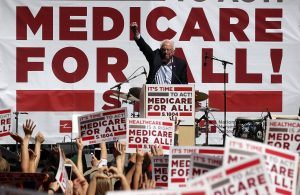Meagan Day and Bhaskar Sunkara in the New York Times:
 A growing majority of Americans agree: Health care shouldn’t be a business. They’re finally coming around to the idea that it can and should be a public good instead — something we can all turn to when the need arises.
A growing majority of Americans agree: Health care shouldn’t be a business. They’re finally coming around to the idea that it can and should be a public good instead — something we can all turn to when the need arises.
The favorite right-wing argument against Medicare for All — the most popular approach to universal, publicly financed heath care — is that it’s too expensive. More on those costs in a moment. But first, we should note that our current health care system is actually the most expensive in the world by a long shot, even though we have millions of uninsured and underinsured people and lackluster health outcomes.
This is partly because a lot of that money doesn’t go directly toward keeping people healthy. Instead it goes to the overhead costs required to keep businesses running. These include exorbitant executive salaries, marketing to beat out the competition, the labor-intensive work of assessing and denying claims and so on. None of these would be a factor in a single-payer, Medicare for All system. Taiwan and Canada both have single-payer systems, and both spend less than 2 percent of total expenditures on administrative costs — and so does the United States’s current Medicare program. By contrast, private insurers in the United States spend as much as 25 percent on overheads.
But the most important way Medicare for All would save money isn’t by slashing administrative costs.
More here.
